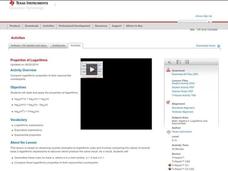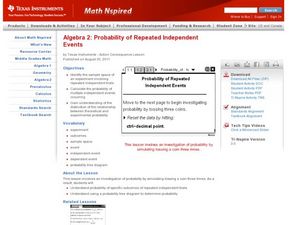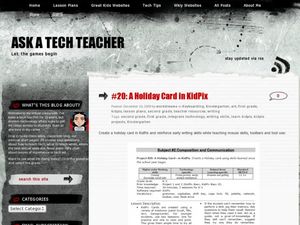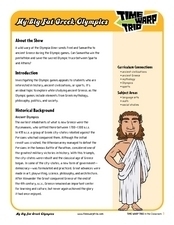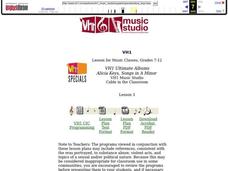Curated OER
Properties of Logarithms
Learners investigate properties of logarithmic function as they add, subtract and multiply logarithms. They graph and analyze the graph for exponential equivalency.
Curated OER
Permutations & Combinations
Young mathematicianss predict the outcome of an event. Learners solve problems using permutations and combinations. They use the TI calculator to see the different combinations and how the groupings occur.
Texas Instruments
Probability of Repeated Independent Events
Statisticians analyze different samples to find independent and dependent events. In this probability lesson, pupils predict the outcome and then calculate the real outcome. They create a tree diagram to help predict the probability of...
Curated OER
Permutations
Learn how to solve the probability that an event will occur. Learners also employ permutations and combinations to find the amount of time it takes for an event to occur. They use the Ti to create a visual of the events.
Curated OER
Let's Make a Compost Cake
Students create a compost cake. In this gardening and decomposition science lesson, students review and describe the "nutrient cycle." Students create a compost pile, measure and record the dimensions and temperature of the pile, and...
Curated OER
A Holiday Card in KidPix
Students create a holiday card using computer software. In this computer card making lesson, students design an original holiday card using a variety of tools. Students navigate the software utilizing various tools.
Curated OER
Earthquakes: Kindergarten Lesson Plans and Activities
Beginning with a pre-lab, kindergarteners trace the letters in the word earthquake and discuss what happens in an earthquake. The lab portion allows young scientists realize that earthquakes trigger shaking of different intensities...
Time Warp Trio
My Big Fat Greek Olympics
The Olympic Games are indeed a significant and far-reaching cultural component in our international community today, but from where do they originate? Where do our traditions stem from, and how do we choose the sports that constitute...
Curated OER
When A Car Coughs. . .
Budding scientists collect and compare particulate exhaust from four different vehicles. They discuss how cars contribute to air quality. To get the most mileage out of this resource, have learners complete the optional step 5, in which...
Curated OER
Wellness and the Benefits of Exercise
Second graders discuss benefits of keeping physically fit, predict effects of exercise on their bodies, perform various exercises correctly, including push-up, curl-up, and jumping jack, discuss and follow safety practices while...
Curated OER
What is Physical Fitness?
First graders explore and discuss what physical fitness actually is, its benefits and how to obtain it through a variety of ways. They summarize the five parts of physical fitness: cardiovascular endurance,muscular strength, muscular...
Curated OER
Alicia Keys, Songs in A Minor
Students watch a video about Alicia Keys and discuss the business side of her career. Groups role-play producers for her new album taking on the responsibility for all aspects, including budgets, contracts, song production, and advertising.
Curated OER
Attributes of Renewable Energy: From Nanopossibilities to Solar Power
High schoolers explore solar energy, why we use it and how we use it. In this renewable energy instructional activity students compare active and solar techniques.
Curated OER
Government
Second graders run for various offices. They dress up like a politician, pretend to be running for an office, and tell the students why they should vote for him/her. They explain why it is necessary for a community to have a government


